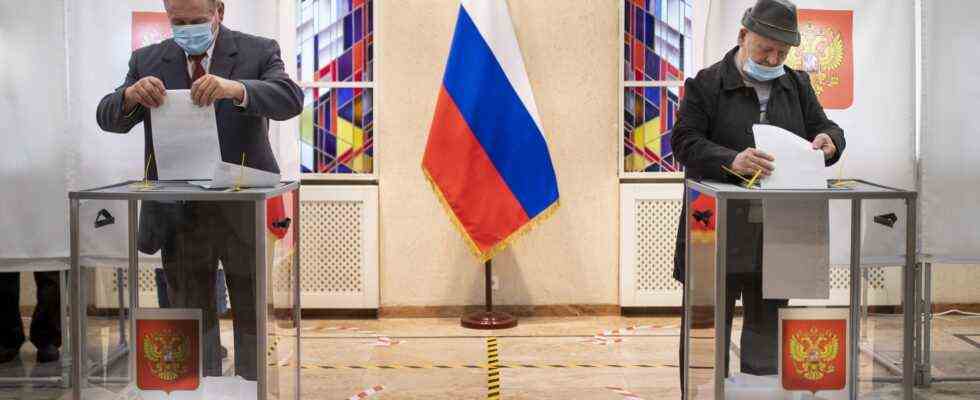Status: 19.09.2021 9:18 p.m.
In the election of a new parliament in Russia, the Kremlin Party United Russia of President Putin is clearly ahead, according to initial results. The elections were overshadowed by massive allegations of manipulation.
From the election for the new State Duma in Russia, the Kremlin Party United Russia emerged as the strongest force, according to initial partial results and projections. In post-election polls, the power base of Russian President Vladimir Putin came to 45.2 percent of the vote, as reported by state television. In 2016, the party received 54.2 percent of the vote.
The communists received 21 percent. These were poll results from voters after they voted, not results. Shortly after the last polling stations closed at 8 p.m. German time, only around ten percent of the ballot papers were counted.
Three days of voting took place
The right-wing populist LDPR party of the ultra-nationalist Vladimir Zhirinovsky and the Just Russia party have also been represented in parliament with 450 members. The LDPR landed at 8.7 percent in the polls, Fair Russia at 7.9 percent. They are all considered to be loyal parties.
Across eleven time zones, around 110 million eligible voters had been called upon over three days to appoint a new State Duma for the next five years.
Duma elections: Information from Ina Ruck
19.9.2021 8:09 pm
Choice overshadowed by allegations of manipulation
However, the election was overshadowed by massive allegations of manipulation. At least 750 complaints of violations have been received, according to the Interior Ministry. However, there is no information about serious violations that could affect the vote.
In contrast, the independent observers from the Golos organization listed thousands of irregularities across the country. They are usually captured with photo and video recordings. Employees enter irregularities on an interactive map, which are reported to them via the hotline or an online form – by the late afternoon there were around 4,000.
The Golos expert Andrei Busin called the extent “significant” – especially in Putin’s hometown of St. Petersburg. There, people literally fought for their votes, as can be seen on videos. In many cases, ballot boxes were crammed full of pre-filled voting slips in packs. There were also reports of compulsory voting, for example among government employees, as well as multiple votes.
Election Commission objects to election fraud
In several other regions, too, there were “massive violations” of the rights of observers and candidates, for example. The choice has “significantly expanded the scope for violations,” said Golos.
The state election commission contradicted the manipulation claims of the organization Golos, which had been classified as a “foreign agent” by the Russian authorities before the election. Your commission had received 137 reports of “coercion” when voting, said commission chief Ella Pamfilowa. In addition, ballot boxes were filled with forged ballot papers in eight cases. As a result, the bosses of three polling stations were removed.
This time observers from the Organization for Security and Co-operation in Europe (OSCE) were not represented because they did not agree with the conditions and the small number of authorized experts. In this huge empire, election observation is particularly labor-intensive. Russia had justified the restrictions for Western observers with the corona pandemic.
Opposition excluded from election
The state election commission also denounced cyberattacks coming from Germany and the USA on the website of their agency. “Huge” hacker attacks were carried out against the website of the election commission – mostly from the USA and Germany, explained Pamfilova.
In addition, the opposition was largely excluded from the election: organizations run by Kremlin critic Alexej Navalny were classified as extremist, and anyone associated with them was not allowed to run for office. Around 50 websites operated by Navalny were blocked, including one that supported the “smart voting” strategy. This was intended to support those candidates in the constituencies who have the best prospects against United Russia. Google and Apple removed a corresponding app on Friday under pressure from the authorities, Telegram and YouTube took similar steps.
Mood test for Putin
The content banned by the authorities was still available on Twitter. The Navalny team resisted criticism that it was used to advertise communist applicants, for example. At the moment – in view of the expulsion of the opposition – it is the only chance to break the monopoly on power of United Russia, said Navalny’s colleague Leonid Volkov.
By early evening, there was a low turnout of just over 45 percent. The vote was seen as an important test of the mood for President Vladimir Putin – the Kremlin Party United Russia is his power base.
It is also the last vote before the 2024 presidential election. Putin, who will be 69 years old next month, has not yet said whether he will run.
With information from Martha Wilczynski, ARD Studio Moscow
Parliamentary elections in Russia: Post-election polls see Kremlin party clearly ahead
Christina Nagel, ARD Moscow, September 19, 2021 9:22 p.m.

